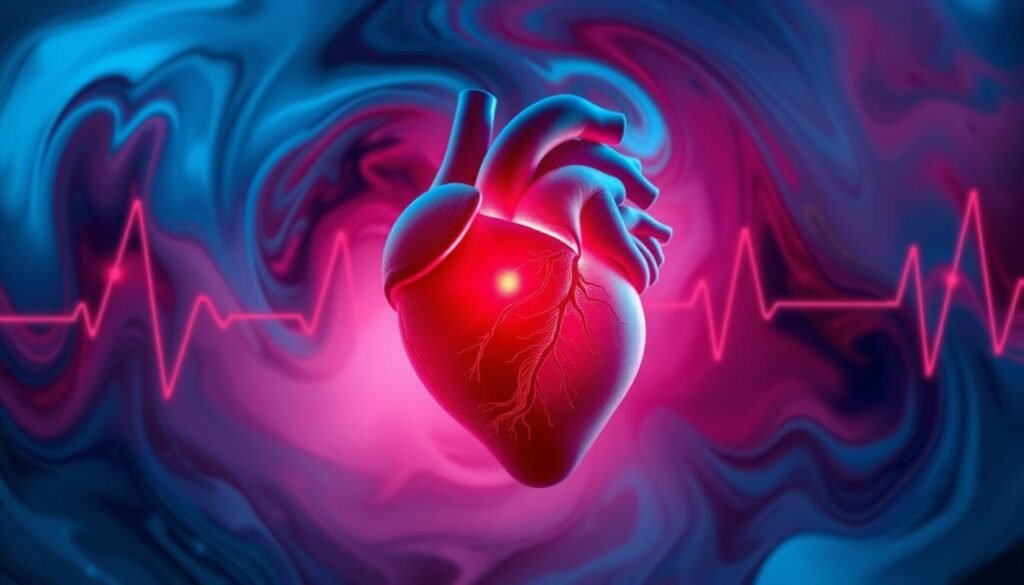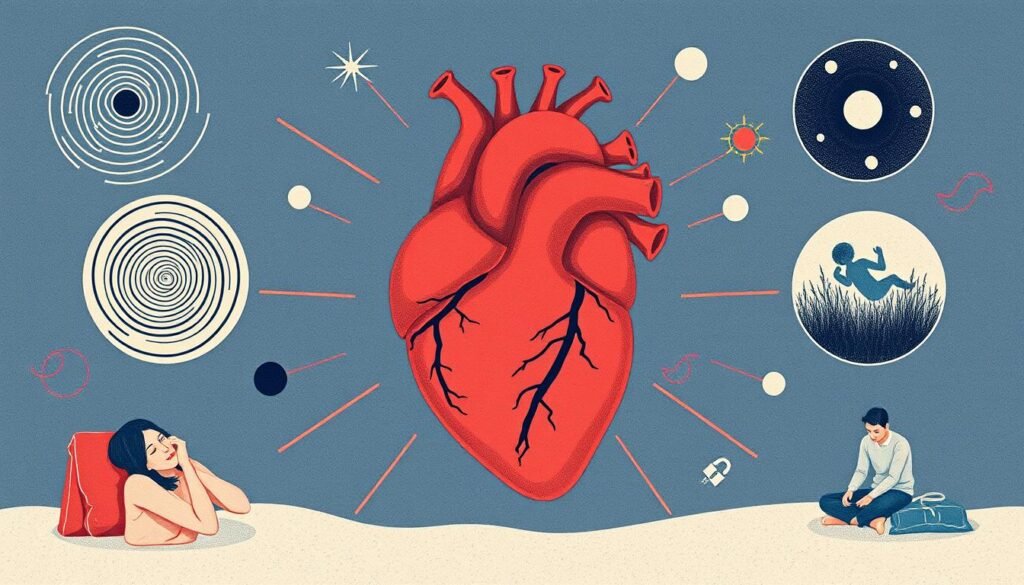Nearly half of all American adults battle heart disease, the top killer among men and women. This alarming fact highlights the need to take symptoms like dizziness and fatigue seriously. These signs, often overlooked, could point to heart issues needing urgent care.
Linking dizziness and fatigue to heart health is critical. If you’re often dizzy, it might mean your heart rhythm is off or you have valve problems. Ignoring these could lead to bigger health problems. Anyone regularly feeling this way should talk to a doctor about potential heart troubles.
To understand more, check out how dizziness is linked to heart issues and its effects on your heart health.
Key Takeaways
- Heart disease affects nearly half of all American adults.
- Dizziness and fatigue can be symptoms of underlying heart problems.
- Recognizing symptoms early can lead to timely diagnosis and treatment.
- Shortness of breath and nausea are more commonly experienced by women with heart issues.
- Prompt medical evaluation is essential to prevent complications.
Understanding Dizziness and Fatigue
Dizziness makes many adults seek medical advice. It can feel like you’re unsteady or light-headed. This can hint at different health problems. Issues like low blood pressure or not enough blood getting to the brain can cause it. Conditions like benign paroxysmal positional vertigo (BPPV) and viral infections, such as vestibular neuritis, are common reasons. Sometimes, rare issues like Meniere’s disease lead to severe dizziness.
Fatigue means feeling extremely tired all the time. It can make daily tasks hard. This tiredness may come from many health issues, like low blood sugar, anemia, or long-term illnesses. When dizziness and fatigue happen together, it’s key to find the cause. This is especially true if these symptoms are often seen or come with other serious signs. Heart problems are a big reason for dizziness, as they affect blood flow and cause tiredness.
Being dizzy can raise the chance of falling, especially in older people. Factors increasing dizziness risk include age, family heart disease history, and lifestyle. Dizziness linked to the heart comes from conditions like arrhythmias or heart failure. It’s important to notice symptoms like chest pain, breathing trouble, or heart flutters. Spotting these early can help you get the right treatment quickly.
Common Symptoms of Heart Disease
Heart disease includes various conditions that harm the heart’s structure and work. Key heart disease symptoms are chest pain, shortness of breath, and palpitations. It’s crucial to know these signs for early medical help.
Chest pain, or angina, is a major sign of heart problems. This discomfort can come with physical or emotional stress. It might feel like tightness or pressure on the chest. Shortness of breath can happen during physical activity or even when resting. It may point to heart failure or other serious issues. Palpitations, feeling an unusual heartbeat, vary from fluttering to a racing heart.
If you have any of these symptoms, see a healthcare provider for a check-up. Illnesses like coronary artery disease grow slowly and might not show signs early on. They need quick spotting and treatment. To learn more about these important signs, check out this comprehensive resource.
In short, heart disease symptoms go beyond the well-known signs. Knowing and acting on these indicators is key to keeping the heart healthy. Ignoring them can lead to serious issues, such as heart attacks. Being aware of the various symptoms helps in taking care of our hearts.
How Heart Problems and Dizziness Interconnect
The heart problems dizziness connection reveals critical insights into cardiovascular health. Dizziness can mean an irregular heartbeat or not enough blood flow from the heart. This might point to serious issues like blocked arteries. If you feel dizzy, pay attention to other symptoms of heart problems too.
Common symptoms of heart disease include feeling sick to your stomach, indigestion, and pain on your left chest side. These signs are worrisome and may show heart disorders. Often, dizziness happens with chest discomfort, signaling not enough brain blood supply.
Knowing signs of heart issues is crucial. Fatigue, sudden sweating, and irregular heartbeats are alarms. These symptoms stress the need to keep an eye on your heart health. If these signs stay or get worse, get professional help. Learning about these signs at this website can help you act fast and avoid big troubles.
Ignoring heart disorders can lead to big problems. Paying attention to signs and adopting a healthier lifestyle can boost your health. Knowing how heart issues and dizziness link is key to staying healthy and avoiding more issues.
Can Heart Problems Cause Dizziness and Fatigue
It’s vital to understand how heart issues can affect your health. Many people with heart problems often feel dizzy and tired. Knowing these symptoms can help spot serious heart issues early on.
Link Between Cardiovascular Disorders and Dizziness
Dizziness can point to many heart conditions. It may show that the brain isn’t getting enough blood. This can be due to arrhythmias, which make the heart beat oddly, causing you to feel like you’re going to faint. Women might feel dizzy and tired more often. So, it’s clear that heart problems can lead to dizziness and fatigue.
Exploring Fatigue as a Heart Disease Symptom
Fatigue might show up well before a heart attack. Research shows that 70% of women felt unusually tired before their heart attacks. This tiredness could be an early warning of heart problems. Being constantly tired, along with dizziness, is a red flag. It’s important to get regular check-ups.

| Symptom | Details |
|---|---|
| Dizziness | May indicate arrhythmias or heart valve problems |
| Fatigue | Common in women; can precede heart attacks |
| Chest Pain | Most known warning sign of heart issues |
| Sweating | Can accompany other serious symptoms |
Heart Conditions Associated with Dizziness
Dizziness may indicate heart problems that need quick care. Two key issues, atrial fibrillation and heart attacks, often cause this feeling. Knowing when to seek help can save lives and improve health.
Atrial Fibrillation and Irregular Heartbeat
Atrial fibrillation is a leading heart rhythm problem. It makes the heartbeat out of sync, limiting blood flow. This can make someone feel dizzy or lightheaded. Inadequate blood reaching the brain causes dizzy spells. Another condition, cardiomyopathy, makes it hard for the heart to pump blood. It can also lead to dizziness.
Heart Attacks and Subsequent Symptoms
Heart attacks show in ways like dizziness and feeling very tired. They cut down blood flow, causing lightheadedness. If you have these signs, getting help fast is crucial. Knowing that dizziness can mean a heart attack is key. Quick action may stop worse health issues. Being aware is vital for anyone with heart problems.
Understanding Shortness of Breath and Chest Pain
Shortness of breath and chest pain are key signs that something might be wrong with your heart. These symptoms can point to serious health issues like coronary artery disease or heart failure. It’s important to recognize them early to get help.
Chest pain and dizziness often come together and mean there might be a big problem. If you feel this way for over 15 minutes, you should call for help right away. These signs can come from many things, including stress, high blood pressure, or stomach problems. But, they can also mean more serious issues like arrhythmias, heart attacks, or cardiomyopathy.

Things like arrhythmias can cause your heart to beat oddly, leading to chest pain and feeling dizzy. A heart attack is very serious and may make your chest hurt badly, spreading to your arms, neck, or back. You might also feel out of breath and dizzy. Other problems like migraines or pulmonary hypertension can also make you feel this way.
Doctors use many ways to figure out what’s wrong, including checking you, looking at your health history, and doing tests like X-rays or heart tests. Treating these issues might include changing your lifestyle, like exercising more and eating better, and maybe taking medicines.
Knowing about these symptoms can help you act fast if something serious happens. It’s good to know that many people feel certain signs before a heart attack happens. The signs can be less clear for women, and people who are older or have diabetes might not show typical symptoms.
| Symptoms | Considerations |
|---|---|
| Chest Pain | Can last more than 15 minutes; may spread to other areas. |
| Dizziness | Often accompanies shortness of breath; requires evaluation. |
| Shortness of Breath | May signal severe heart conditions; monitor duration and severity. |
| Warnings | Many experience subtle symptoms before a heart attack. |
The Role of Arrhythmias in Dizziness
Arrhythmias are a major concern for heart health. These uneven heartbeats can change the heart’s rhythm, causing various health problems, including dizziness. It’s important to know about arrhythmias to stay healthy.
What is Arrhythmia?
An arrhythmia means the heart beats too fast, too slow, or with an irregular pattern. There are several kinds, like tachycardia, when the heart beats over 100 times a minute. Or bradycardia, with a rate under 60 beats per minute. Atrial fibrillation, another type, makes the heart beat in a fast, uncoordinated manner, raising the risk of stroke.
In extreme situations, arrhythmias like ventricular fibrillation can be deadly. This is unless the heart’s rhythm is fixed quickly.
Impact of Arrhythmia on Well-Being
Arrhythmias affect more than just the heart. They often cause dizziness or faint feelings, impacting day-to-day life. People might feel tired or weak, which lowers their overall well-being. Things like heart disease, high blood pressure, diabetes, and unhealthy life choices can lead to arrhythmias.
It’s vital to tackle arrhythmias. This helps avoid serious problems and improves life quality.
Recognizing Symptoms of Heart Failure
Symptoms of heart failure can sneak up slowly and be quite tricky. A very common sign is intense fatigue. It makes people feel really tired, even if they haven’t done much. Another sign many people notice is shortness of breath. This can happen during activities or even when just lying down. These signs might mean the heart isn’t working well, hinting at heart problems.
Another symptom to watch for is swelling in body parts like the ankles, feet, or belly. This swelling is due to fluid build-up. It happens when the heart can’t pump blood well. About half of the time, this is because of left-sided heart failure. This type can make fluid collect in the lungs. That makes the shortness of breath even worse.
It’s really important to recognize these symptoms early. If things get worse, it can cause big health issues, like hurting the kidneys or liver. If you or someone you know is showing signs of heart failure, seeing a doctor quickly is key. They can help manage the symptoms and prevent more serious problems.

| Heart Failure Symptoms | Details |
|---|---|
| Fatigue | Extreme tiredness that lasts even after resting. |
| Shortness of Breath | Difficulty breathing, particularly during exertion or while lying down. |
| Swelling | Fluid buildup in the ankles, feet, or abdomen, leading to visible swelling. |
| Confusion | Mental cloudiness caused by inadequate blood flow to the brain. |
| Palpitations | Irregular or rapid heartbeat that can feel unsettling. |
When to Seek Medical Attention
Knowing the key signs of heart health issues is crucial. It helps us know when to seek medical attention. Symptoms like dizziness, chest pain, and extreme tiredness are alarming. They suggest you might have serious heart problems such as atrial fibrillation or heart failure.
About 40% of people will faint at least once in their lives. While often not serious, it’s better to be safe. If you have sudden chest pain, find it hard to breathe, or feel very weak, you should act fast by calling 999. Also, gaining more than two or three pounds in a day or five pounds in a week could mean heart failure. It’s key to notice these signs for your heart’s health.
If you feel dizzy and it’s related to your heart, you’ll likely have other symptoms. These include shortness of breath and swelling in your legs or arms. To figure what’s wrong, doctors might run blood tests, do scans like MRI and CT, or have you do exercise tests. Treating heart disease well means making lifestyle changes, taking medicines, or sometimes surgery.
To discover more about heart conditions and how they’re coded in healthcare, click here. Being quick to react to these danger signs can greatly help in treating heart issues.
Conclusion
It’s clear that issues like dizziness and fatigue are often linked to heart problems. Many people with heart conditions report feeling these symptoms. Since heart disease is a major cause of death in the U.S., paying attention to these signs is key.
Research has looked at why heart failure makes people feel so tired. It turns out, biological and social factors play a role. For example, low hemoglobin levels or having had a stroke can make fatigue worse.
It’s also found that stress in relationships can increase feelings of tiredness. This really shows how complex and personal heart-related fatigue can be. Understanding this can help improve the lives of those affected.
Noticing symptoms like dizziness and tiredness is crucial. If they happen along with heart issues, seeing a doctor is important. Getting help early can make a big difference in managing heart health better.